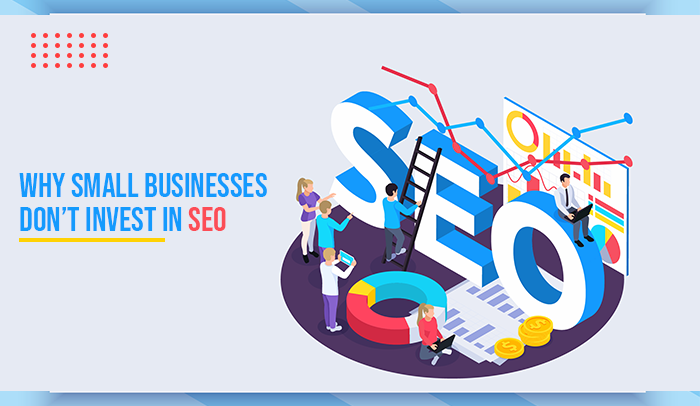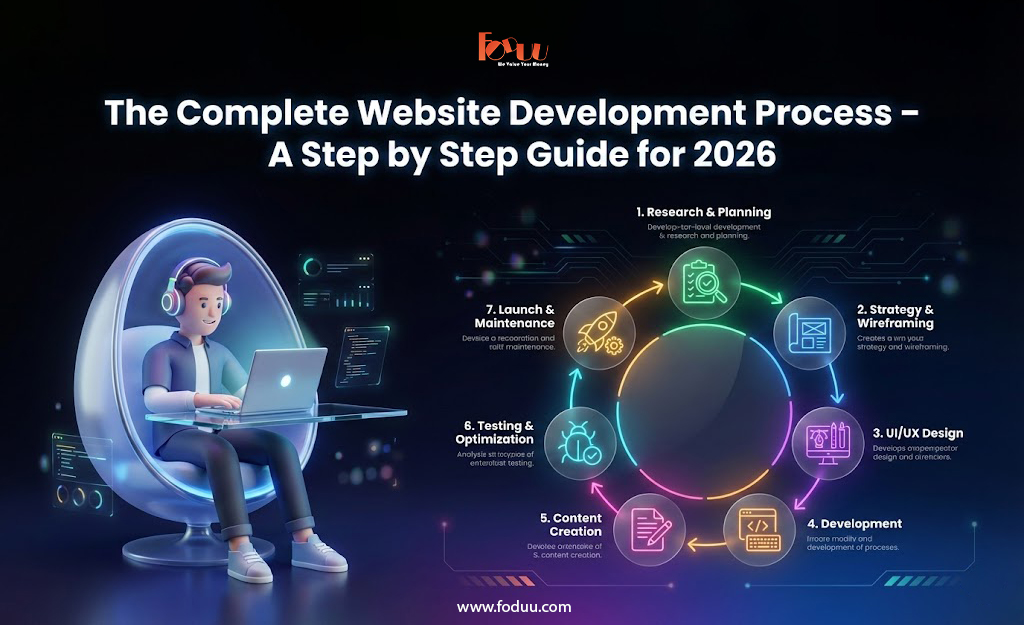In the modern digital age, where a company's online presence has the power to make or break it, Search Engine Optimization or SEO ervices, has become an essential part of any effective marketing plan. Considering that 68% of online experiences start with a search engine, a business's bottom line can be greatly impacted by utilizing SEO. But even with SEO's demonstrated ROI, a lot of small businesses are still afraid to spend money on it.
This article will discuss the value of SEO, all of its advantages, and the main reasons small businesses frequently ignore this important resource.
What is SEO?
SEO, or Search Engine Optimization, refers to the process of optimizing a website to improve its visibility in search engine results pages (SERPs). By optimizing various elements such as content, keywords, meta tags, and backlinks, businesses can increase their website's organic (non-paid) traffic and attract more qualified leads.
The primary goal of SEO is to improve the quantity and quality of organic traffic to a website from search engines like Google, Bing, or Yahoo. Search engines use algorithms to determine which websites should appear at the top of their results pages for specific search queries. SEO aims to make a website more attractive to these algorithms by improving its relevance, authority, and user experience.
Why SEO Matters:
In today's hyper-competitive digital landscape, where millions of websites vie for attention, SEO is essential for standing out and attracting potential customers. Here's why SEO matters:
1. Increased Visibility and Traffic:
SEO Services is crucial for businesses looking to stand out in the crowded online marketplace. By optimizing their websites to rank higher in search engine results pages (SERPs), businesses can attract more organic traffic. When a website appears prominently in search results for relevant keywords, it gains visibility to a broader audience, leading to increased brand awareness and exposure.
Moreover, organic search traffic is highly targeted, consisting of users actively seeking products or services related to their needs. As a result, businesses can expect higher-quality traffic from organic search, which is more likely to convert into leads or customers.
2. Better User Experience:
SEO goes beyond merely improving search engine rankings; it also focuses on enhancing the overall user experience. A well-optimized website is fast-loading, mobile-friendly, and easy to navigate, providing visitors with a seamless browsing experience. By optimizing various aspects such as page speed, site structure, and content organization, businesses can create a positive impression on users, encouraging them to explore further and engage with the site.
Additionally, search engines like Google prioritize websites that offer a superior user experience, rewarding them with higher rankings. Thus, investing in SEO not only benefits users but also aligns with search engine algorithms, leading to improved visibility and traffic.
3. Higher Conversion Rates:
Organic search traffic often yields higher conversion rates compared to other channels. This is because users who find a website through organic search are typically in the consideration or purchase phase of the buying cycle. They are actively searching for products or services relevant to their needs, making them more likely to convert into leads or customers.
Furthermore, organic search traffic is earned through trust and credibility, as users perceive top-ranking websites as more authoritative and trustworthy. By consistently appearing at the top of search results, businesses can build trust with their target audience, leading to higher conversion rates and increased sales.
4. Long-term Sustainability:
Unlike paid advertising, which requires ongoing investment to maintain visibility, SEO provides sustainable results over the long term. While paid advertising stops generating traffic once the budget runs out, organic search traffic continues to flow as long as the website maintains its search engine rankings.
With consistent effort and optimization, businesses can maintain or even improve their search rankings over time, driving continuous traffic and leads without additional advertising costs. This long-term sustainability makes SEO a valuable investment for businesses looking to establish a strong online presence and achieve sustainable growth.
Benefits of SEO:
In the digital age, businesses are constantly seeking cost-effective ways to enhance their online presence and attract customers. Search engine optimization (SEO) has emerged as a powerful tool that offers numerous benefits for businesses of all sizes. Here's a simple breakdown of why SEO matters:
1. Cost-effectiveness:
Compared to traditional advertising methods like print or television ads, SEO provides a higher return on investment (ROI) and a lower cost per acquisition (CPA). This is because SEO targets users who are actively searching for relevant products or services, making it more likely to attract qualified leads and customers. With SEO Services, businesses can reach their target audience without spending exorbitant amounts on advertising, making it a cost-effective marketing strategy.
2. Reliability and Authority of the Brand:
Users view websites that routinely appear at the top of search results as more reliable and authoritative. By optimizing their websites for search engines, businesses can enhance their brand credibility and attract more customers. When users see a website ranking highly in search results, they are more likely to trust the brand and engage with its products or services, leading to increased brand recognition and customer loyalty.
3. Competitive Advantage:
In competitive industries, ranking higher in search results can give businesses a significant edge over their competitors. With effective SEO strategies, small businesses can compete with larger corporations on a level playing field. By optimizing their websites for relevant keywords and providing valuable content, businesses can improve their search engine rankings and attract more customers, thereby gaining a competitive advantage in the market.
4. Local Search Optimization:
Local SEO is very helpful for brick and mortar establishments in drawing in local clients who are looking for goods or services in the region. Increasing foot traffic to physical stores and sales can be achieved by optimizing for local search. Businesses may increase their exposure in local search results and draw in local clients by focusing on local keywords, improving Google My Business listings, and obtaining good ratings.
Top Reasons Why Small Businesses Don't Invest in SEO (Search Engine Optimization):
Small businesses often overlook the importance of Search Engine Optimization (SEO) due to various reasons. Here are the top 5 reasons why small businesses may not invest in SEO:
1. Lack of Awareness or Understanding:
One of the primary reasons small businesses may not invest in SEO is a lack of awareness or understanding of its significance. Many business owners may not be familiar with SEO or its benefits, leading them to prioritize other aspects of their business. Educating small business owners about the value of SEO and its potential impact on their online visibility and growth is crucial.
2. Limited Budget:
Small businesses often have tight budgets, and they may consider SEO as an unnecessary expense, especially when they are just starting. They might prioritize other immediate needs, such as paying rent, employee salaries, or purchasing inventory. However, it's essential for small businesses to understand that investing in SEO can lead to long-term benefits and cost savings by driving organic traffic to their website, reducing the need for paid advertising.
3. Perception of SEO Complexity:
SEO can be a complex and ever-evolving field, which may intimidate small business owners who lack technical knowledge or expertise. They might think that implementing an effective SEO strategy requires extensive time, effort, and resources, which they might not have. However, small businesses can still benefit from SEO by focusing on basic on-page optimization, creating quality content, and building a strong online presence through local listings and social media.
4. Short-Term Focus:
Small businesses often have a short-term focus, as they need to address immediate challenges and ensure their survival. They may not see the long-term benefits of SEO and prefer to invest in strategies that offer quicker results, such as paid advertising or social media marketing. However, it's crucial for small businesses to recognize that SEO is a long-term investment that can significantly improve their online visibility, credibility, and customer acquisition in the long run.
5. Belief in Paid Advertising or Other Marketing Channels:
Some small business owners may believe that paid advertising, such as Google Ads or social media ads, is a more effective way to reach their target audience. They might also rely heavily on traditional marketing channels like print ads, billboards, or local events. While these marketing strategies can be beneficial, they often have limited reach and higher costs compared to SEO. By investing in SEO, small businesses can attract a larger, more targeted audience and enjoy long-term benefits without continuous advertising expenses.
Conclusion:
Despite the challenges and barriers, investing in SEO is essential for small businesses looking to compete and thrive in today's digital landscape. By understanding the importance of SEO, its numerous benefits, and the reasons why small businesses often overlook it, businesses can make informed decisions and take proactive steps to improve their online visibility and drive growth. With the right strategies and resources in place, small businesses can harness the power of SEO to attract more customers, increase sales, and achieve long-term success in the digital age.










